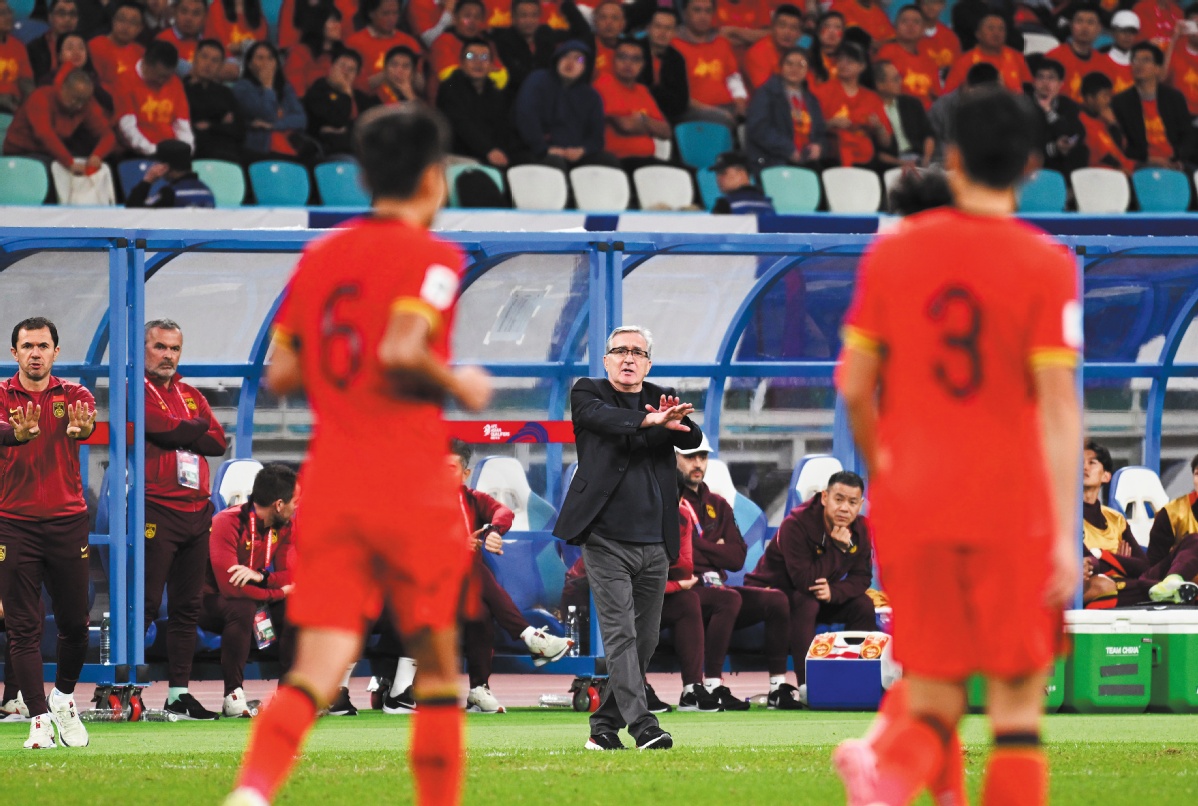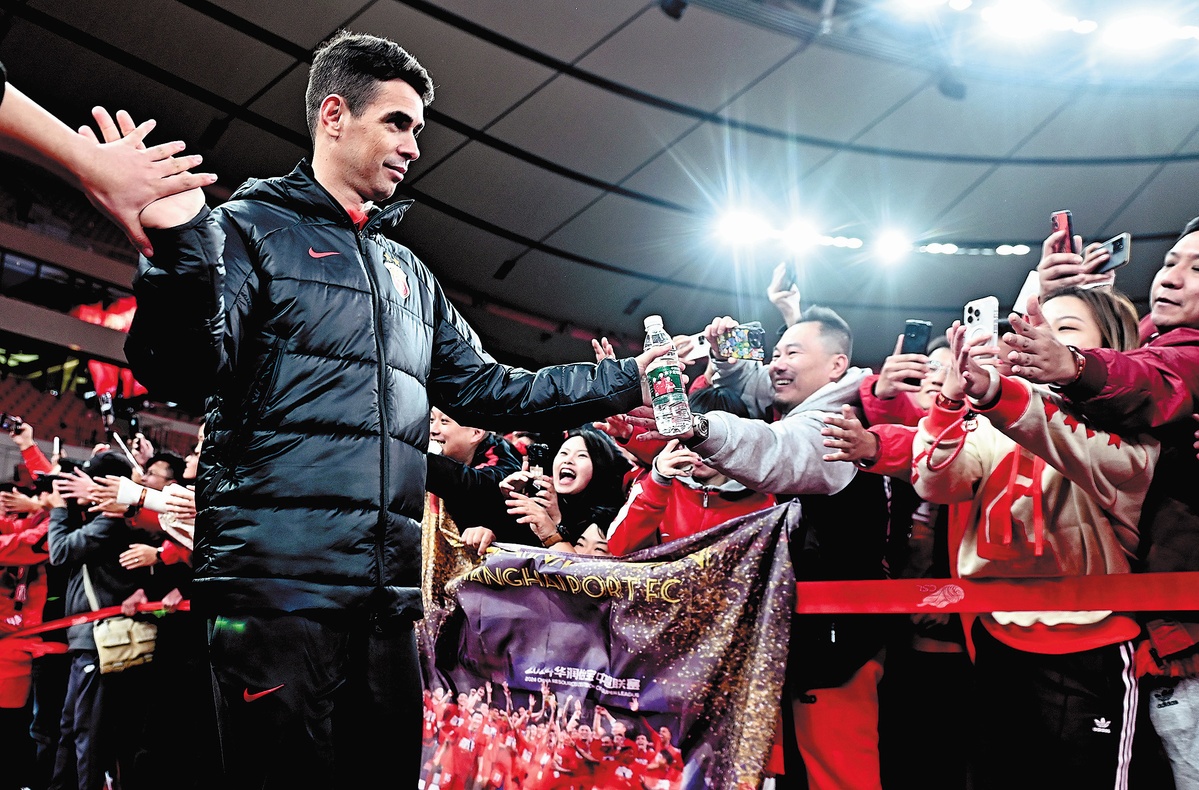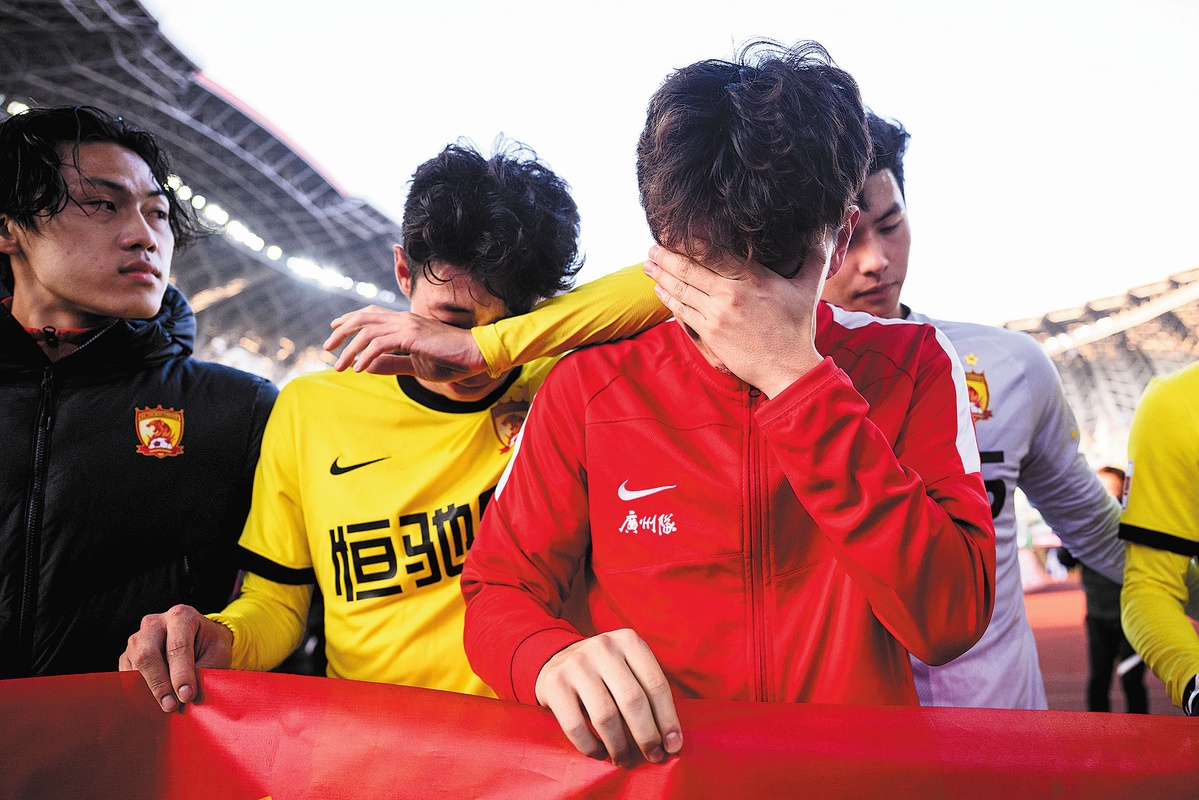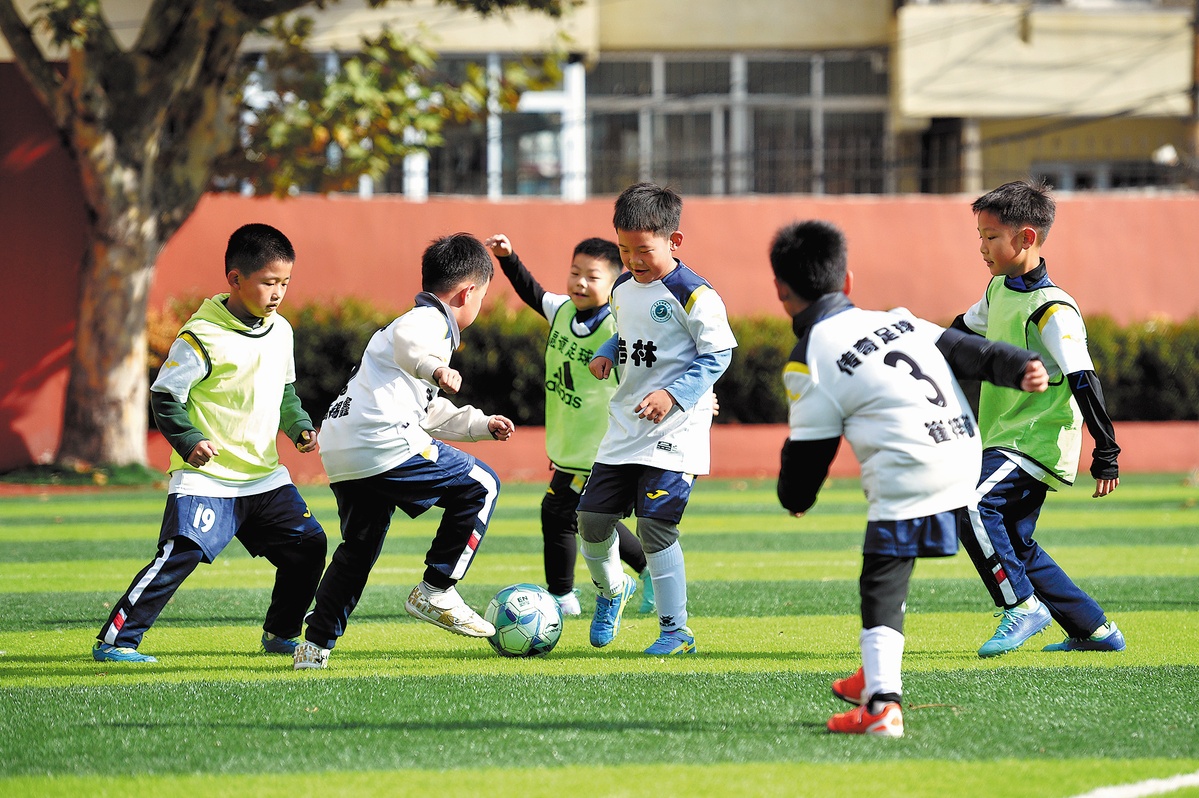
The Chinese men's national team retains a slim chance of making it to the 2026 World Cup Finals and has offered fans a glimmer of hope for a positive outcome. XINHUA
With the men's team struggling in its World Cup qualifying effort, and the domestic league losing its appeal, Chinese soccer signed off an eventful year craving a healthier future, away from the ill repute of numerous corruption scandals.
As sports fans relish China's athletic achievements after a remarkable Olympic year, the country's mediocre soccer program would hardly place high up on any honor rolls, with a series of setbacks and incidents, such as the men's squad's worst-ever Asian Cup outing and jail sentences for several former coaches and officials for corruption, all of which took a heavy toll on the sport's profile.
The men's squad's remaining hope for making it to the 2026 World Cup Finals, though, has offered fans at least something to look forward to, despite the fact that it faces massive task to survive a tough group and qualify for the marquee FIFA tournament for only the second time since its solo appearance in 2002.
Led by Croatian head coach Branko Ivankovic, Team China finished its 2024 campaign at the bottom of its six-team group in the current third-stage qualifying tournament, following three wins, two draws and five losses over 10 previous qualifiers. Yet, Ivankovic's plucky side remains alive, tied with three other group contenders on points, but just shy on goal difference.
The six critical points earned by its two wins so far in the current stage, against Bahrain and Indonesia respectively, kept Team China in the running after it opened the third round with a humiliating 7-0 rout at the hands of group leader Japan in September, followed by two straight defeats to fourth-ranked Saudi Arabia and 2nd-placed Australia.
With two direct qualification berths reserved only for the top-two finishers, well beyond its reach, Team China has realistically set its sights on either third or fourth place. If it can manage that, it will head into the next qualifying phase to compete for the two last tickets to the FIFA showpiece, which will be staged in the United States, Canada and Mexico.
The March 20 match away to Saudi now appears a do-or-die battle for Ivankovic's men, who completed a solid 10-day offseason camp last month.
"We've basically had an overhaul of the national team (over the past year), adding some new blood, becoming younger and slowly having adapted to a new system," Ivankovic said after the training camp in Haikou.
"Our boys worked really hard, knowing that they need to step it up a gear to prepare for the tough World Cup qualifiers ahead of us.
"I am glad that we proved to the fans that we are building a new national team, and we will try to pay back their support with better results."
Even with the team finishing the year languishing in 90th place in the FIFA world rankings, its worst position in a decade, Ivankovic has at least dug it out of the mire of 12 months ago, when the squad crashed out at the group stage of the 2024 Asian Cup in a frustrating goalless campaign — two draws and one loss — under former coach Aleksandar Jankovic.
Jankovic was fired immediately following China's exit from the continental soccer jamboree, prompting the Chinese Football Association to turn to the more experienced Ivankovic.
On the women's side, the "Steel Roses" finished 17th in the world and fourth in Asia. Australia's Ante Milicic took charge of the team in a year that lacked any official international matches, offering both Milicic and the squad a valuable opportunity to regroup.

As the last of the big-name signings during the spending spree of the 2010s, former Chelsea midfielder Oscar bids farewell to his Chinese club Shanghai Port in December. XINHUA/WANG HAIBIN/ZHANG CHUNLEI/FOR CHINA DAILY
League appeal wanes
At the league level, the continuous financial struggles of even some of the country's most celebrated clubs set the tone for a gloomy 2024 season, with the total number of spectators attending Chinese Super League matches dropping to its lowest since 2015 at 4.66 million.
The disbanding of eight-time CSL champion club Guangzhou FC after the 2024 season, due to heavy debts stemming from the impact of the pandemic and profligate spending on imported players, triggered mixed reactions from the sport's community, with fans lamenting the fall of the giant, while critics hailed the end of the "big-spending" era of the Chinese leagues.
The club, formerly known as Guangzhou Evergrande, together with another CSL team Cangzhou Mighty Lions and the third tier's Hunan Billows, all failed to pass CFA's financial review for entry into the 2025 season, winding up being disbanded by investors, which further exposed the fragile financial status of China's soccer pyramid.
Once relying on cash-rich owners, CSL clubs enjoyed short-lived success on the continental stage in the 2010s, highlighted by Guangzhou's AFC Champions League wins in 2013 and 2015, led by World Cup-winning managers Marcello Lippi of Italy and Brazil's Luiz Scolari, respectively, and bolstered by expensive squads, filled with high-profile imports.
The lure of Chinese clubs, funded by millionaires from the retail and real estate industries, proved too lucrative for even some of Europe's top stars to turn down, drawing the likes of former Argentina international Carlos Tevez and Brazilian internationals Oscar and Alexandre Pato to join CSL clubs for staggering transfer fees.
As the last of the big-name signings during the spending spree, former Chelsea midfielder Oscar bid farewell to his Chinese club Shanghai Port in December after helping the franchise defend its CSL title with an all-time, league-high ranking points total of 78, one point more than the previous record set by Guangzhou in 2013.
Meanwhile, Wuhan Jianghan edged out Changchun Dazhong Women by just one point to retain the CFA Women's Super League title in September, completing a stranglehold of five league championships in a row.

The disbanding of eight-time CSL champion Guangzhou FC after the 2024 season highlights the financial problems in China's domestic league. XINHUA/WANG HAIBIN/ZHANG CHUNLEI/FOR CHINA DAILY
Fighting corruption
Throughout 2024, China's anti-graft authorities, supported by law enforcement departments, intensified the crackdown on illegal activities in soccer that resulted in more than 10 notable figures, including former players, coaches and CFA officials, being sentenced to prison terms for their involvement in match-fixing and bribery.
Among those investigated and punished, the highest-profile offender was arguably former men's national team coach Li Tie, who was sentenced to 20 years in prison by the Xianning Intermediate People's Court in Hubei province in December for bribery-related crimes.
The 47-year-old former midfielder, who was on China's only World Cup roster in 2002, was found by prosecutors to have offered bribes to officials who helped him win election to the position of national team coach in 2020, before accepting bribes from some certain league clubs to select their players into the national squad during his tenure.
Former deputy sports minister Du Zhaocai, former CFA president Chen Xuyuan and former CFA secretary-general Liu Yi were also convicted of bribery and sentenced to jail terms last year.
In September, a special investigation led by the General Administration of Sport of China and the Ministry of Public Security uncovered 120 matches suspected to be tainted by match-fixing or gambling, spanning various leagues and competitions, including the CSL, the CFA Cup and the top-tier women's league, implicating 41 affiliated clubs.
A total of 43 former players, referees, coaches and club executives were banned for life from taking part in any soccer-related activities after the investigation, which has also dismantled 12 online gambling gangs.

More effort is needed to tackle corruption among coaches and officials, as well as prioritizing grassroots soccer development. XINHUA/WANG HAIBIN/ZHANG CHUNLEI/FOR CHINA DAILY

More effort is needed to tackle corruption among coaches and officials, as well as prioritizing grassroots soccer development. XINHUA/WANG HAIBIN/ZHANG CHUNLEI/FOR CHINA DAILY